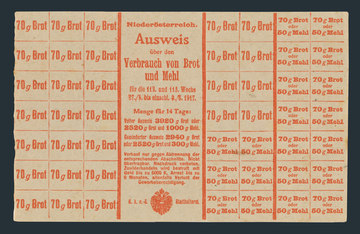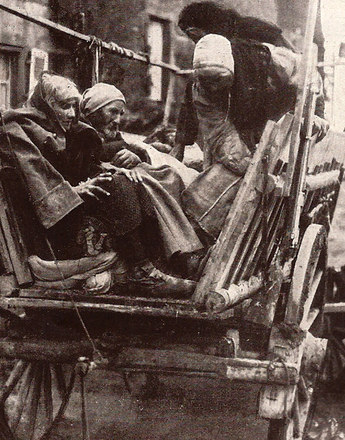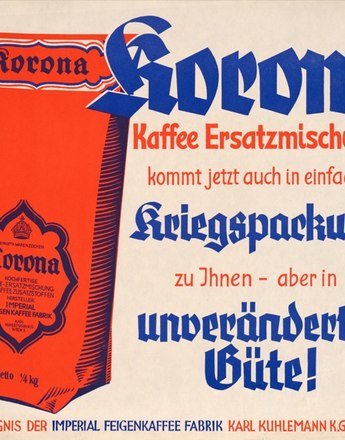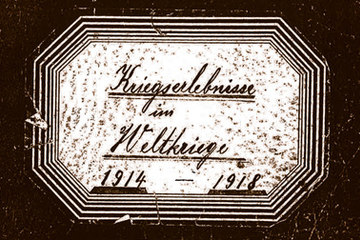-

Moritz Ledeli: Conductress of the municipal tramway, watercolour, 1915/16
Copyright: Wien Museum
Partner: Wien Museum -
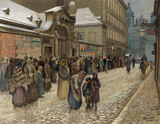
R.A. Wolf: Queue in front of a food store in Vienna’s Rasumofskygasse, watercolour, 1917
Copyright: Wien Museum
Partner: Wien Museum -
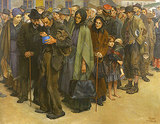
Josef Engelhart: Vienna in 1918, painting
Copyright: Wien Museum
Partner: Wien Museum -
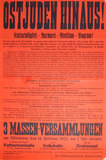
“Eastern Jews out!”, poster, 1923
Copyright: Wienbibliothek im Rathaus
Partner: Wienbibliothek im Rathaus – Vienna Library in the City Hall
In the fourth year of the war there was a widespread feeling of ‘burn-out’ in the Habsburg Monarchy, with the supply situation in a catastrophic state and the mood of the general population one of war-weariness and frustration. The initial euphoria was now long forgotten.
It was not just that there was an extreme lack of military equipment and raw materials in the army – in the hinterland the supply system broke down entirely. Although all the states involved in the war were having to cope with supply crises, Germany and the Western Powers were able to fend off the worst consequences because they were better organized than Austria-Hungary. In no other field did the state authorities of the Monarchy fail so conspicuously to cope with the problems of the day.
Every possible commodity was in short supply, even foodstuffs and heating fuel. According to official statistics, agricultural production had fallen by around forty per cent as compared with its level before the war. As home production was no longer sufficient to ensure basic supplies, foodstuffs were requisitioned from the occupied areas in Russian Poland, Serbia and Rumania, though even these deliveries could not make up for the shortages. That the agrarian state of Austria-Hungary finally even had to ask its ally Germany for supplementary deliveries was an alarming signal indeed.
Rampant inflation and draconian rationing hit the urban population particularly hard. The quantities of food allocated per person were constantly reduced, so that in the winter of 1917/18 the towns experienced a genuine famine. The failure of the state authorities caused a boom in the black market and public law and order was seriously threatened by the first hunger uprisings.
Production was also severely affected by the reduction in the available workforce caused by conscription. As the prisoners of war did not suffice to make up for the lack of hands, women were recruited in large numbers to do jobs hitherto predominantly done only by men. Now the burden of the daily round lay on women’s shoulders, causing a temporary transformation of the image of woman in society.
In the greater part of the Habsburg Monarchy the consequences of the war were only experienced indirectly, as the hostilities took place on the peripheral area and the core Habsburg lands were not affected by the actual destruction. However, in the border zone between Austria and Italy and most particularly in Galicia there was considerable devastation and the military authorities subjected large parts of the civilian population to mass resettlements and deportations. Another consequence of the war was the vast number of refugees: in particular, the majority of the Jewish population of Galicia – estimates by researchers range from around 80,000 to 125,000 persons – took flight from the Russian-controlled areas and headed for Vienna, where they met with a wave of anti-Semitism.
Translation: Peter John Nicholson
Hanisch, Ernst: Der lange Schatten des Staates. Österreichische Gesellschaftsgeschichte im 20. Jahrhundert [Österreichische Geschichte 1890–1990, hrsg. von Herwig Wolfram], Wien 2005
Hirschfeld, Gerhard/Krumeich, Gerd/Renz, Irina (Hrsg.): Enzyklopädie Erster Weltkrieg. Aktualisierte und erweiterte Studienausgabe, Paderborn/Wien [u.a.] 2009
Leidinger Hannes/Moritz, Verena: Der Erste Weltkrieg, Wien [u.a.] 2011
Rauchensteiner, Manfried: Der Erste Weltkrieg und das Ende der Habsburgermonarchie 1914–1918, Wien u. a. 2013
-
Chapters
- The course of the war 1917–1918: Face-to-face with imminent downfall
- The situation in the hinterland
- Apathy and resistance – The mood of the people
- The Sixtus Affair: A major diplomatic débacle
- A programme for world peace – President Wilson’s Fourteen Points
- ‘To My faithful Austrian peoples’ – Emperor Karl’s manifesto
- The collapse
- The disintegration of the Habsburg Monarchy – Part I: On the road to self-determination
- The disintegration of the Habsburg Monarchy – Part II: The situation in Vienna and Budapest
- The last days of the Monarchy

